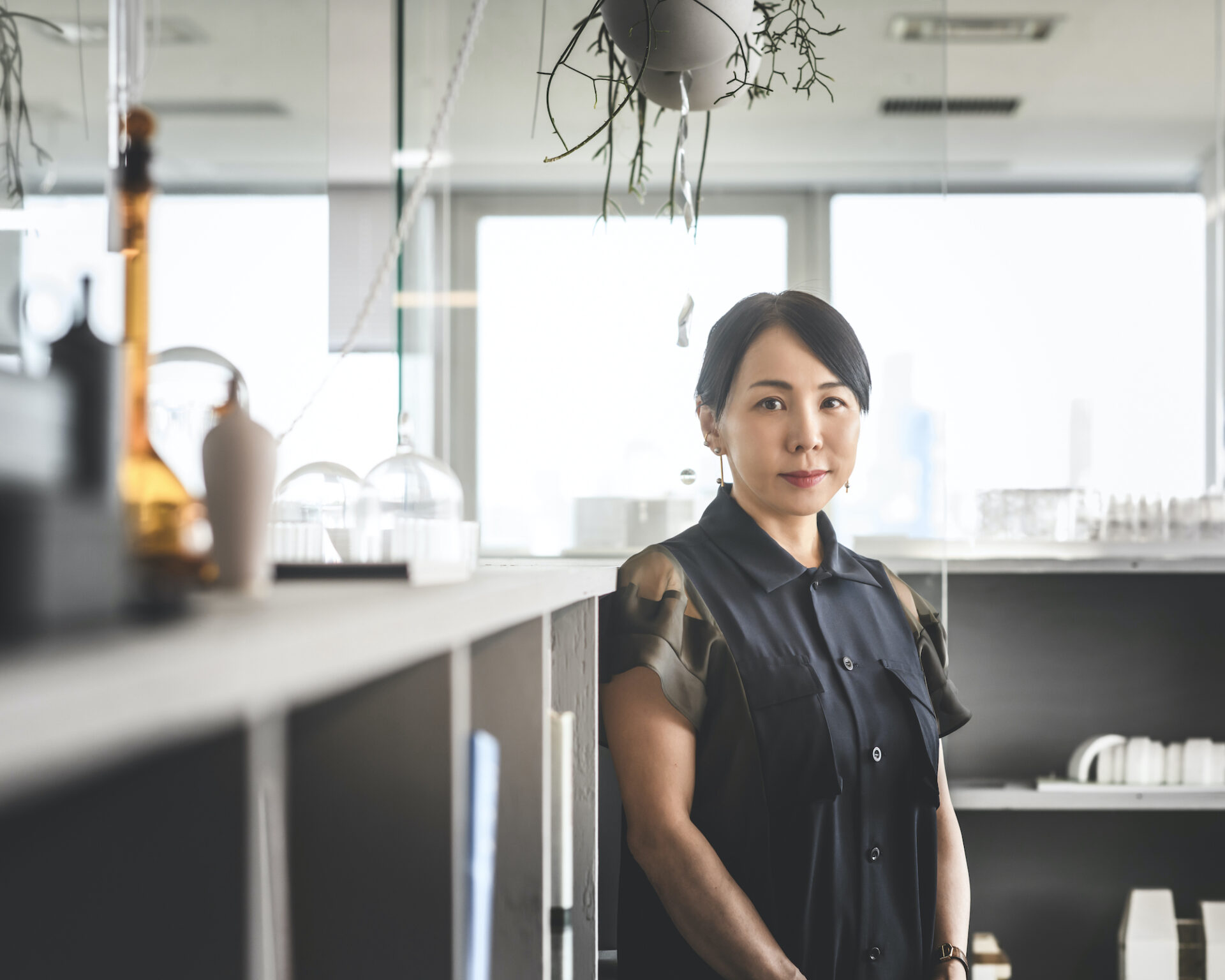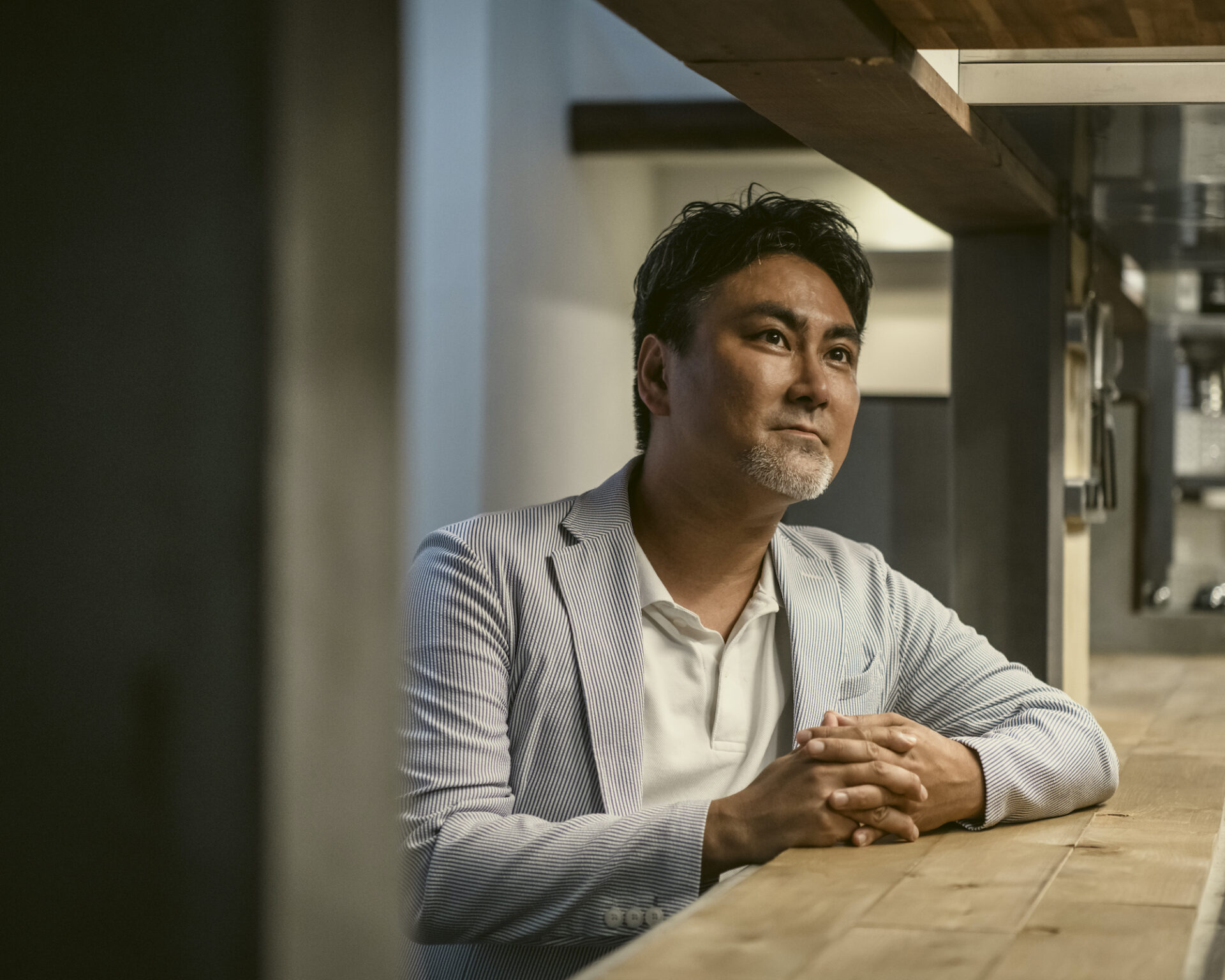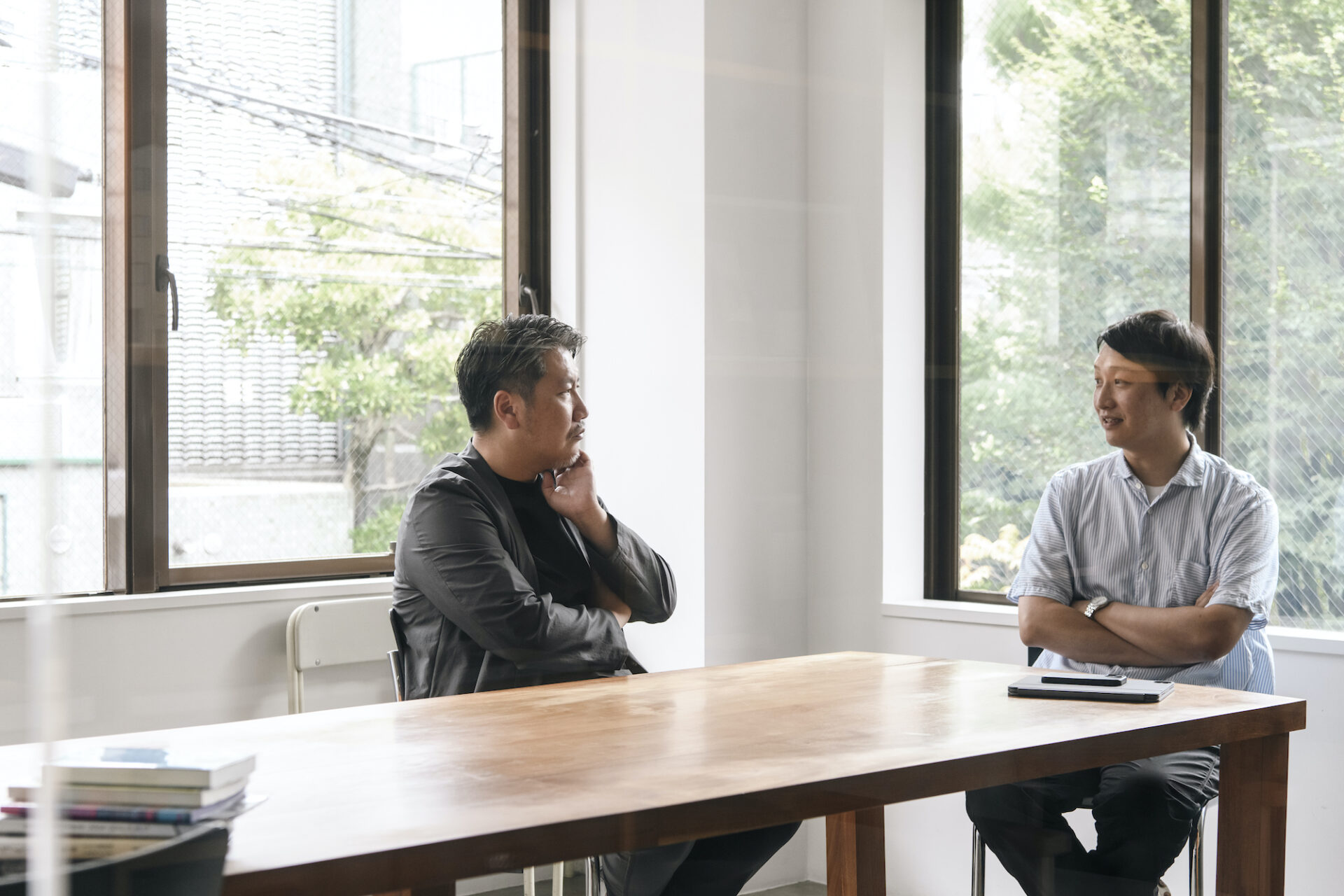
2024-09-26
Vol.10
Architect
Shuzo Okabe(part 1)
-
What is Happiness for the City, Countryside, and Global World?
-
Resonance of Atmosphere
-
Abundance of Not Being Misled by Information
-
From the Perspective of "Dynamic Equilibrium"
-
Authenticity Required for Manufacturing
-
Creating Infrastructure by Self-Sufficiency and Positive Cycle
-
The Potential of "Mezzanine"
In today’s world, where information is flying around, it is extremely important to discern whether the information at hand is truly reliable. The attitude to constantly question the authenticity of information encourages free-wheeling thinking unbound by preconception and shapes a spiritually abundant and happy society. Shuzo Okabe, who runs his architecture firm and engages in diverse activities, including product design, branding, and business development, describes his attitude toward activities as “having approached to everything with full of solid reason unbound by any preconception.” Don’t we just do things that we are told to do? Don’t we neglect thinking more deeply about why things are how they are? Don’t we judge things only from the point of view of economics or efficiency? In the dialogue between the two old acquaintances, you will find questions that need to be answered to make manufacturing work as an infrastructure to support local communities, society, and people’s happiness.
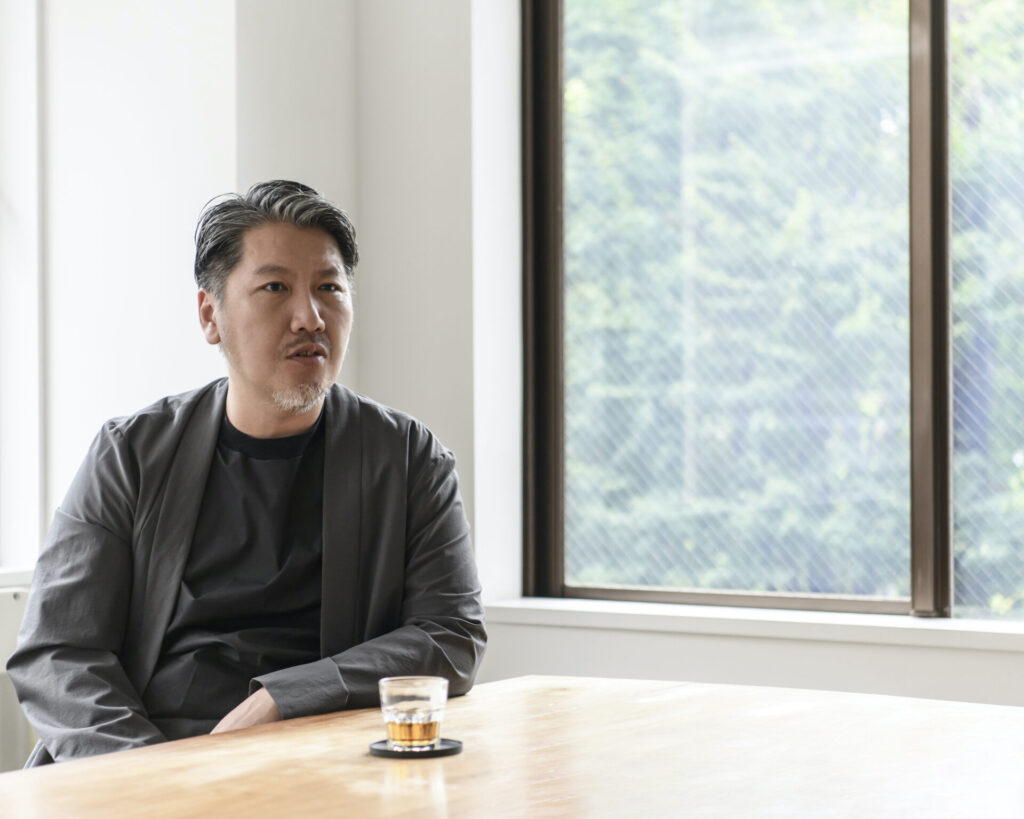
“Architects think about life and its meaning from multiple angles and see things from a broad perspective.” (Shigeta)
——I hear that the two of you have known each other for a long time and have made inspection tours together before. Could you tell us why you chose Mr. Okabe as today’s dialogue partner?
Masakazu Shigeta: Whenever we talk, the conversation always leads to interesting topics. So, I thought it would be OK to talk about how we have been doing recently. I have seen and experienced what Mr. Okabe has been doing every now and then, and his activities have always piqued my interest. In addition to architecture, he acquired the Tobe-yaki (Tobe Pottery) project, which he had produced himself, and also started a project to mine whetstone, a porcelain material. “Shiro Ao” is the Tobe pottery brand developed by Mr. Okabe, and it is what is now called a regional revitalization project. He started working on it in his mid-twenties, like lifework, and there are many other examples.
I also have started a project in Minakami, Gunma. The project’s purpose is to preserve and pass down regional resources and assets to future generations, and the central theme is how to de-centralize the population concentrated in Tokyo to the countryside. Will forcing yourself to stay in Tokyo really make you happy? Is it really a good thing to focus your business field on the Japanese domestic market amid a population decrease and weak yen? What is more, how will capitalism change in the future? I am interested in topics like that and want to know Mr. Okabe’s thoughts today.
Shuzo Okabe: You sent me a message with about three lines of text that said something like what you just mentioned. If I remember correctly, the keywords were city, countryside, global, and capitalism.
Shigeta: I have many friends who are architects, and those I feel comfortable talking with are often architects. It is probably because they see things from a broad perspective and think about life and its meaning from multiple angles. In the world of architects, whenever you build something, clarification and definition of requirements are very important. However, artists cannot exercise their creativity if they try to do the same thing. Since it is said that those who can entirely skip the “process” have the quality to become the best artists, there is a stark contrast with architects, which I found interesting.
I always gain so much insight from talking with architects, perhaps because my thought process is closer to that of architects. We share the same target, which is to make people happy by producing things based on the clarification and definition of customer requests.
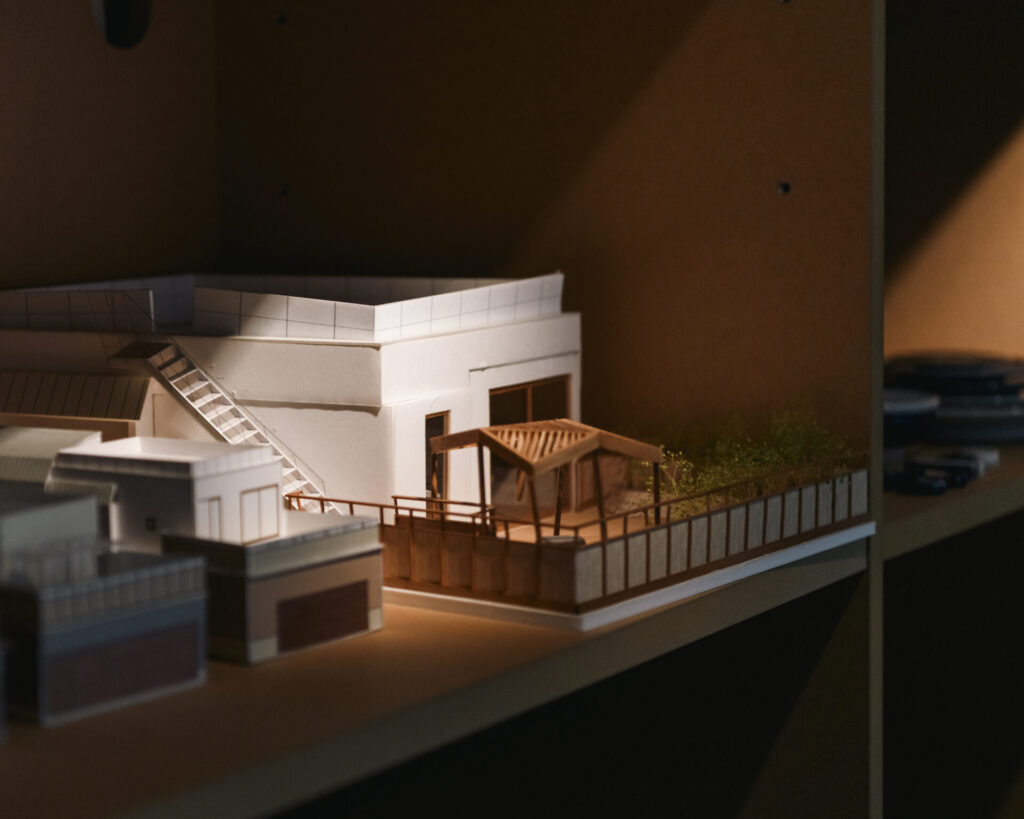
Okabe: What you just mentioned about “this is what architects are like” describes the profession of architects very precisely. But actually, there are not many architects like that. I think the number of architects pursuing the fundamental is rather decreasing.
After all, architecture is always connected with the public, and even when building a private residence, we can not ignore the relationship with the public and the local community. At the same time, we need to have a broad perspective and timeline. I think these three are the most important credentials for the architect.
After receiving the offer of dialogue today, I read the past articles and found all of them interesting. Speaking of current Japanese society as a whole, it is difficult to say that people feel happiness. However, compared to the past, people have more opportunities to become happy, and there are many cases you can change the situation by your actions. Therefore, there is a meaning to talk about what happiness means to us.
——In a world where the movement of people, goods, money, and information becomes more active, what are your thoughts on happiness for the city, countryside, and the global world?
Okabe: First of all, although this might be a matter of opinion, I don’t use the word “countryside,” and I always use the word “region” instead. The reason is that the word “countryside” is based on the idea that it is another area seen from the center. I don’t have such recognition. Rather, it is crucial to have the perspective that each region has its characteristics. The same goes for the word “global” because there is no difference in regions since all of them equally exist on the same planet. We tend to interpret everything in the global context once we go outside Japan, but I wonder if we need to make distinctions.
Now, it is easier than before for not-well-known small regions to start something new by directly connecting with each other across national borders. That is where the potential lies, and I think having such connections became much easier after the pandemic. Certainly, there might be some downsides to the flattening of information. However, seeing regions in Japan and other countries have direct connections and start something new is much more exciting.
When I went overseas before, I often started relationships with local communities through local acquaintances, and I felt a sense of security as the relationships expanded. But now, I think it is more refreshing and exciting to know music I have never heard or fashion I have never seen. The same goes for jobs. I once went abroad by receiving a job invitation, but I found I didn’t know anybody there and had nothing in common with the customers. But as we talked, it turned out that we shared similar visions. Things like that are happening worldwide simultaneously, and I believe such situations will lead to people’s happiness in the future.
Shigeta: I believe the current situation, where many encounters between things of not well-known origin are occurring worldwide, is related to the end of the COVID-19 pandemic. The pandemic had blocked the flow of people and things worldwide, and the end of it entirely released it, resulting in the beginning of exchanges at a tremendous momentum. I personally feel that the wave influenced me, and my thoughts on national identity have changed significantly over the past year. Until then, I thought Japanese culture and aesthetics were some of the most essential resources for competing in the global market. But recently, I have wondered if earnestly pursuing the culture of my own country will lead to happiness and abundance. To put it bluntly, I have even started to think it is not innovative.
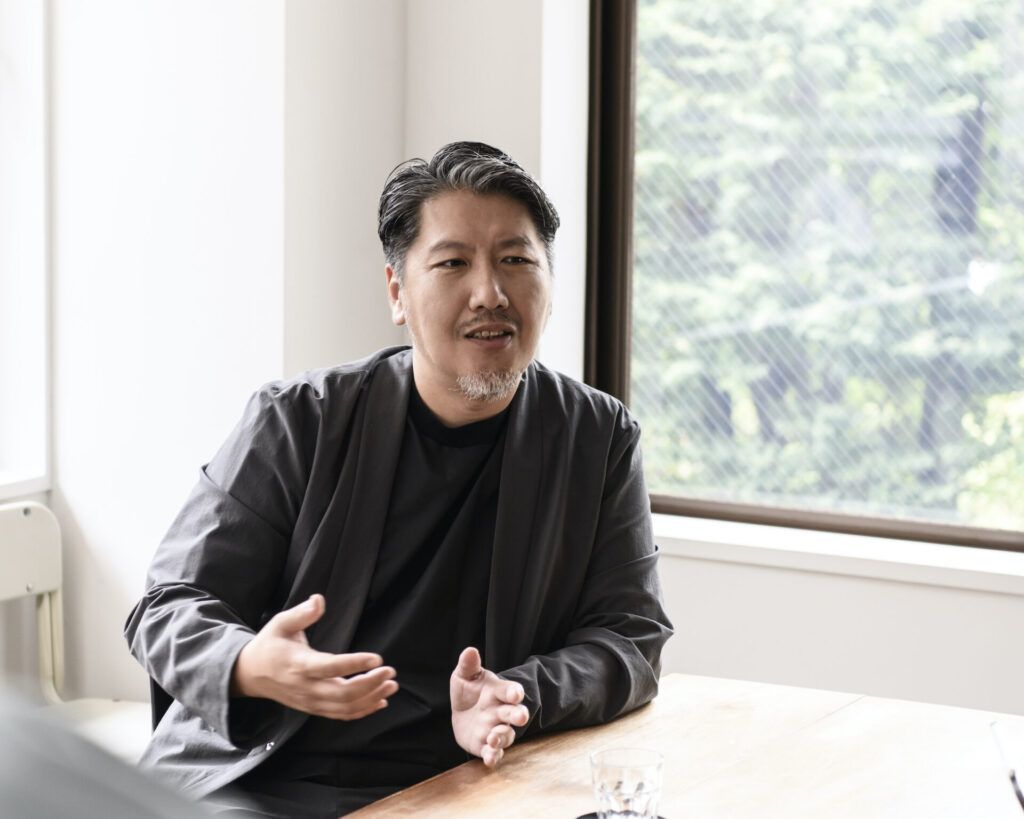
——Is the movement where small communities connect with each other to create new possibilities happening in large cities like Tokyo?
Okabe: It is difficult to grasp the whole picture because each region and community is beginning to explore various possibilities, but the movement is definitely happening. That is because I am interested in the “system” now.
——What do you mean by the word “system”?
Okabe: Simply put, it is like an invisible power to move complex combinations of various elements. Democracy or capitalism is one of them, and society is based on it. Laws are also a type of system. In the case of organizations and companies, there is a system called a rule that defines the role inside them. I call these things the “system” as a whole, and I understand that it controls people objectively.
Whenever I get involved in projects, I try to figure out the system behind them. It is the system of government that I pay attention to when I work on the government’s projects. When I work with a specific organization, I try to understand the organization’s system to determine what I can and can not do. Even inside the system, each behaves differently depending on the situation, so it is essential to understand it first. The project will not go well if you omit the process and try to make decisions from an ethical point of view. Moreover, since each industry has different systems, it is not easy to understand all of them. Still, by understanding it, the business will become more interesting to be involved with, and it will also increase the likelihood that you will have more possibilities to change something that nobody could before.
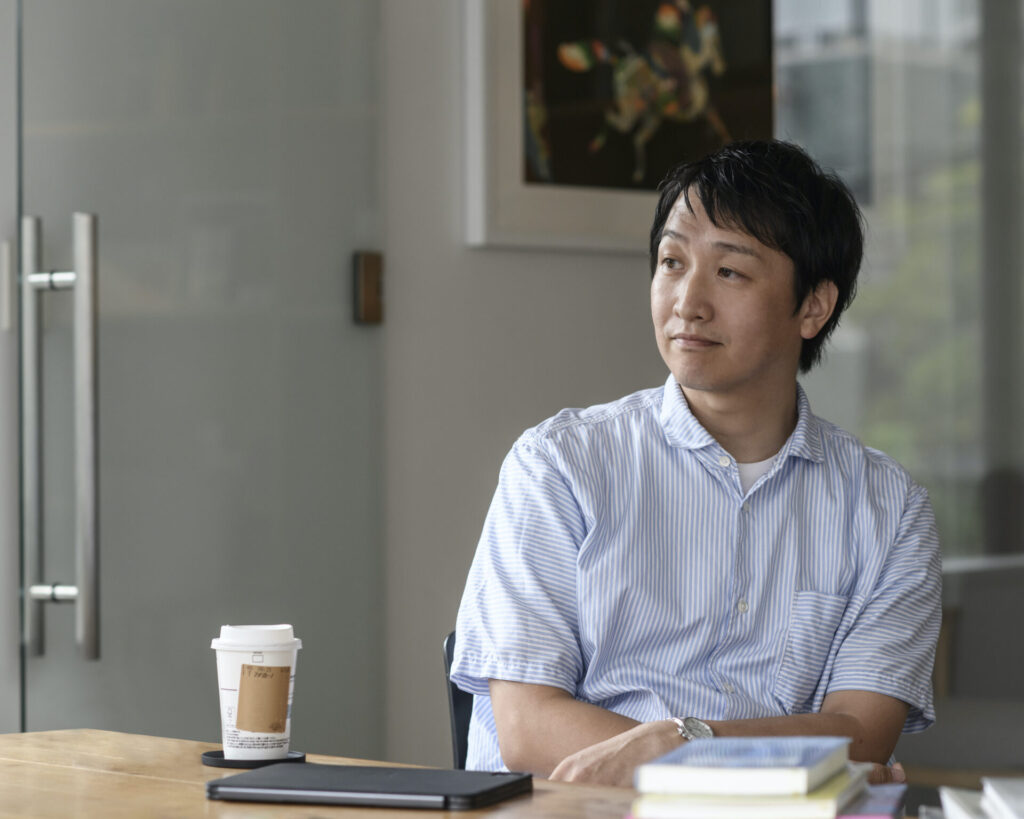
“Probably, certain people have started to notice that the expansion of the numbers will bring us nowhere.” (Okabe)
Shigeta: I took my children to Disneyland in the United States this summer. Unlike Disneyland in Tokyo, the cast members there do not say hello with a smile. (laugh) You can not expect such hospitality there. Only Micky was friendly, but others were not. For Japanese people, Disneyland is a place full of hospitality, but that is only true in Japan, not Disneyland in other countries.
Seeing the service of Tokyo Disneyland, people in my generation think this is a good part of Japanese culture that must never be lost, but that way of thinking might already be old-fashioned. To provide service based on endurance, training, and effort does not match the sensitivities of today’s young people. Even from the perspective of sustainability, other countries’ styles, which allow people to do things freely and unbound by various social constraints, make sense. If we force young people to do it, arguing that it is a good part of the Japanese culture of hospitality, they will just leave Japan for overseas. Hospitality is by no other means based on self-sacrifice. I think young people are good at creating an atmosphere that resonates with others, where they entertain others while also enjoying themselves at the same time. I believe that is the kind of rationality for their generation.
Okabe: That makes sense.
Shigeta: In a sense, countries like South Korea have increased their market value of content by pursuing quality stoically and developing influential content. There are more and more scenes where I encounter opinions, comparing the two countries cosmetics industries, that South Korea has momentum while Japan is conservative. I understand what they mean, but Japan already did in the 1990s what South Korea is doing now. So, I feel there is something wrong with the opinion that Japan is “falling behind.” Rather, the question is what Japan should do next after the culture has come full circle.
Okabe: I agree with you. Listening to what you just said, I thought there is a difference between new things that are created referring to old things and those that are created focusing on new things. It is always difficult to understand something entirely new and unprecedented.
The high level and accessibility of South Korean entertainment results from pursuing newness while learning from the past, and it is better in terms of economic rationality because more people accept new things that have something in common with the past contents. Whether good or bad, we live in an era between the two sides, so it might be the role of our generation to bridge them, understanding the difference between the two.
Shigeta: I think we are in a transitional period where there is a mixture of people trying to do something new based on old ideas and people trying to do new things based on new ideas. Also, in companies and organizations, I see some people trying to create new things with the older OS while others are trying to develop with the latest OS. However, it is still challenging for people with different OS to exchange ideas and thoughts well. There might come a time when they coexist in the future, but I am concerned about it, seeing the situation now.
Okabe: One of capitalism’s basics, shaped by the Industrial Revolution, is creating and selling as many products as possible. In the case of the content business, the way to make money was to spread it widely and increase consumption. That is why the size of the population and the ratio of young people were considered an important element. However, the movement of people and information is so active today that the idea of “more is better” will gradually lose meaning, I believe. Probably, certain people have started to notice that the expansion of the numbers would bring us nowhere. On the other hand, some still believe that more is better, and the story of the OS you just told has something to do with it. Since there are people of different positions who live together, it is natural that various ways of thinking coexist.
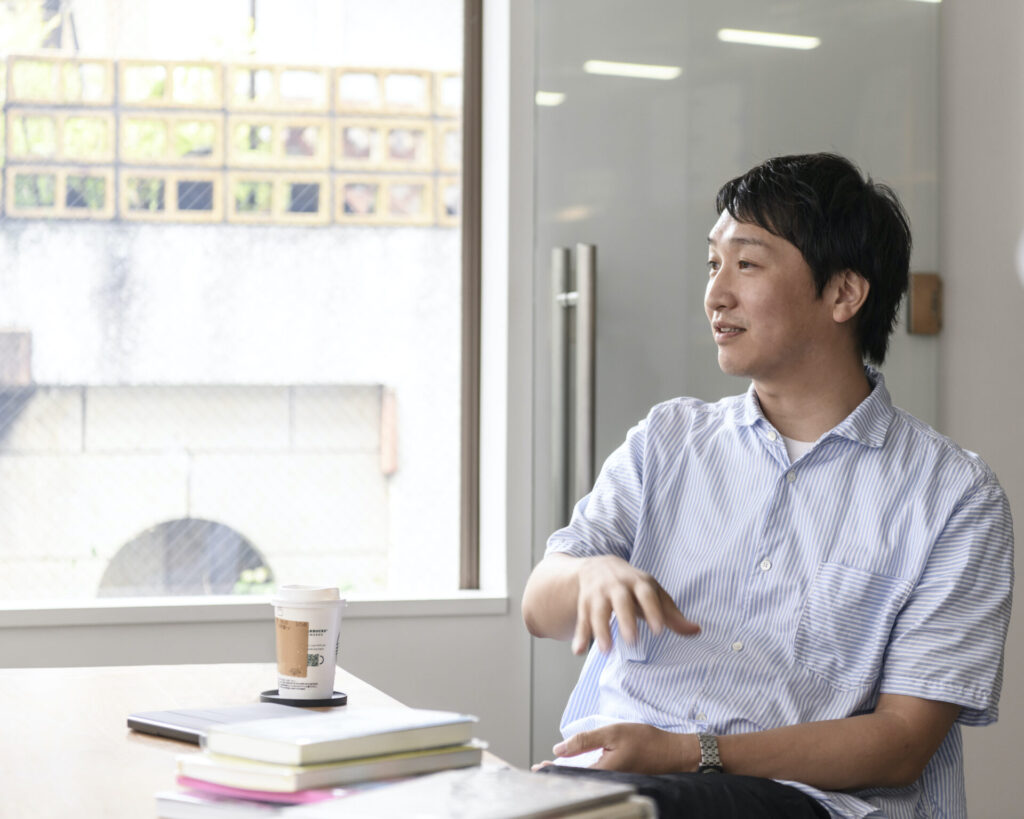
“I always pay attention to whether the scale matches the direction I want to take.” (Okabe)
Okabe: There is only one reason I work on business strategy and product development while running an architecture firm: this is the only way I could avoid the game of just increasing numbers.
Generally speaking, the justice of branding and marketing is to advertise products and services widely and increase sales by 100,000 yen rather than 10,000 yen, 1 million yen rather than 100,000 yen, and 100 million yen rather than 1 million yen. But is it really so? When can we feel happiness after we keep increasing the sales?? Working on it with such a mindset, I came to the conclusion that I had to build my own team to achieve my goal.
Providing and expanding the scale of what I believe is something that makes me happy, but being honest without overreacting is much more important, which is what Mr. Shigeta always says, “Create with honesty.” On that point, I always pay attention to whether the scale matches the direction I want to take.
——What do you pay attention to when matching the direction and the scale?
Okabe: That is relatively simple. We refer to precedent cases and previous experiences to determine the appropriate business type and target scale. Each project has a sort of contour, depending on its scale, like that of a few hundred million yen, a few billion yen, and more than that. I am most interested in projects worth a few hundred million yen. The rough image of such projects is like a fancy local bakery or coffee shop where you can find the face of the owner just behind the counter. I think I would be happy if I could work on projects like that. The multi-billion-yen projects that Mr. Shigeta is involved in have different attractiveness, but I feel I might find it difficult to entirely focus on them.
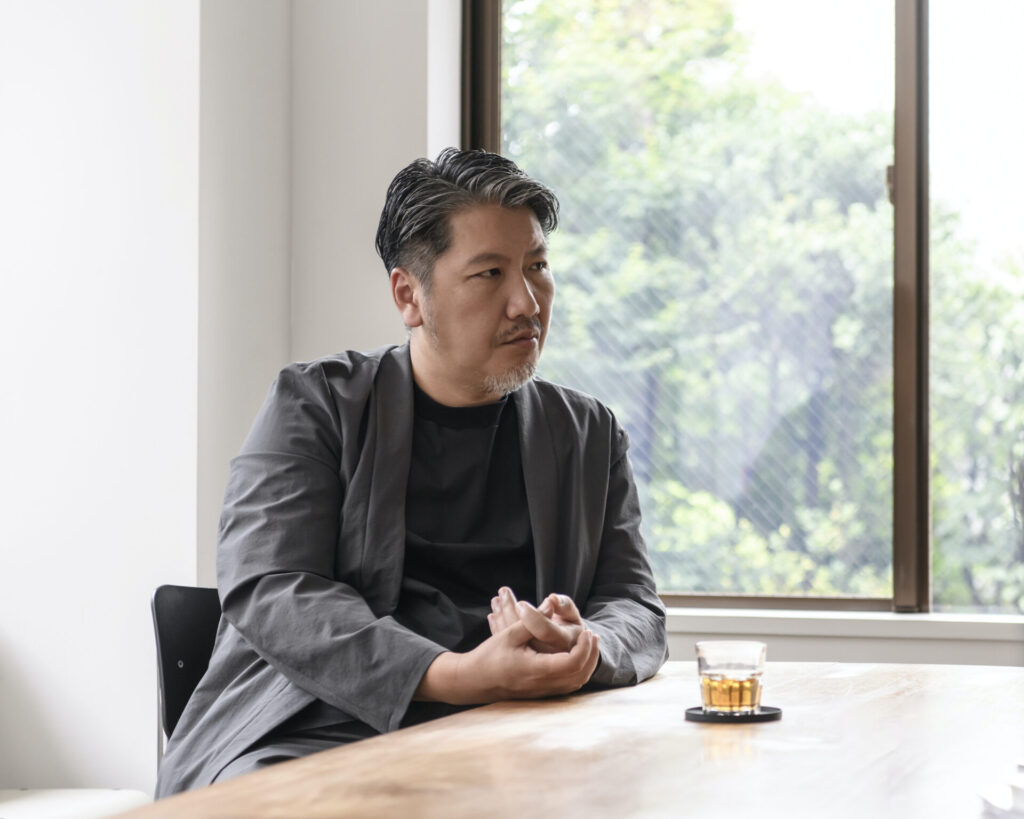
——Is it difficult even for Mr.Okabe to establish a business where customers can feel the owner’s existence if the business scale is large?
Okabe: I think it is difficult if I want it that way. There might be a way to create something like a symbol and do business under its name, but it will be something different. However, there are also things we can only do with a specific business scale, which will create other possibilities. The scale of projects differs depending on the type of business, so it is difficult to say which is good and which is bad. Therefore, it is vital to keep doing it by determining the proper direction.
Shigeta: Speaking of the business scale, the recent business trend is from large to small. But for me, it is something like gradation brought by information manipulation, and the trend has become apparent as fewer people are swayed by information with the changing times. Since it is a gradation, a certain number of people are still manipulated by information. However, as the number of people who are careful enough not to be manipulated by information increases, PR strategies, and SNS marketing will gradually lose their meaning. They judge products by their eyes, and they will buy one if they see it as good and not if it is not. They will find it is what makes them spiritually abundant.
Okabe: Even if we use the same word, when we talk directly, we finally find that we understand the word in entirely different ways. The situation surrounding small businesses is a good example. I think people who say “small business is good” are mostly those who do not work on business properly. Many of them design their small businesses using the logic of large-capital companies without understanding the essential parts. If you get involved in regional revitalization projects in several regions, you will often notice many people talking about business without considering the proper business scale and without an image of figures. The worst thing is that such people often argue the wrong theory of small businesses, which is often based on their illusionary idea, to those engaged in retail business of proper scale, and there are many cases like that. I just wish we could do obvious things obviously.

“I simply wish that more people see things from the perspective of ‘dynamic equilibrium.'” (Shigeta)
Shigeta: After all, one of the most significant issues in Japan is the finance side.
Okabe: I think there would be more opportunities for what we call small businesses if they have a proper financial structure. I think the major issue is that the financial structure, including literacy, is not working well, although Japan has a relatively stable banking system.
Shigeta: The system of subsidies is strange, first of all. If the government gives subsidies with the determination to accept loan defaults, they should allocate more financial resources to something like start-up loans. The idea of relying on subsidies because they can not obtain the required amount of money through start-up loans needs to be corrected in the first place. In other countries, micro-financing works as a system to support the start-ups. Some funds invest without hesitation in a start-up with huge deficits if they think it has cultural importance or is necessary to maintain diversity in the social ecosystem. Unfortunately, we don’t have it in Japan. I hope crowdfunding is used more for essential purposes than pre-sale purposes.
Okabe: Speaking of foreign funds, I think they invest not only because they think it is ethically correct but also because they expect a return in the long run from the investment viewpoint. Things with high social requests and demand have potential, with no doubt. It is natural to invest in such things.
Shigeta: Although this is not limited to Japanese people, I simply wish that more people see things from the perspective of “dynamic equilibrium.”
Since the Industrial Revolution, humans have burdened themselves as they went in a direction wholly opposed to a human-like livelihood. It might be necessary, but COVID-10 shocked society when the stress was almost at its peak. I think society is now in a state where it is fixing its shape, which has been intensely deformed by stress, to the original “equilibrium” state.
Returning to the equilibrium state is, in a sense, to become happy. In the era where properties were central to people’s lives, happiness was equal to obtaining new tools. While happiness in the rapid economic growth era was achieved through obtaining material value, happiness nowadays is linked to gaining a human-like livelihood, and the definition of happiness is completely different. It would be great if people in finance would notice it and change their investment behavior, but there is a gap in recognition.
Okabe: Although the era we live in might be considered the same term as the World War, if you look back at the previous eras, you will realize that human beings repeatedly created and scrapped things and came back and forth in the same place. Investors are not perfect, after all. Since their job often focuses on increases and decreases in short periods, it would be difficult for them to grasp the broad picture.
(to be continued in the second half)
Notes:
Shiro Ao
Shiro Ao is a brand that mainly deals with pottery. Preserving the tradition of Tobe ware, Ehime prefecture’s representative pottery, the brand aims to encourage more people to use it in their modern lives.
Unlike conventional product development through the collaboration between traditional techniques and design, the project explores the potential and possibility of the local community and industry through the archive of the methods and skills of the pottery studio and encourages communication between them. The brand received the GOOD DESIGN AWARD in 2015.
https://shiroao.jp/
Dynamic equilibrium
Dynamic equilibrium refers to the state in which things constantly move and keep the balance. Shinichi Fukuoka, a biologist, explains life from a dynamic equilibrium perspective. He advocates that life is continuously changing to remain the same, and “life is adaptive to environment and flexible to change because life is in the state of dynamic equilibrium.” Also, it is said that “diversity” is the key to maintaining the state, and the number of elements supporting it leads to the strength of dynamic equilibrium.
Profile
-
Shuzo Okabe
Okabe was born in 1980 in Ehime Prefecture. In 2005, he received his master’s degree from the Graduate School of Media and Governance at Keio University. In 2004, aiming for “Architectural approach to future environment,” he established the architecture firm “upsetters architects.” The firm provides environmental design based on architectural thinking and strategy design to realize the continuous exploration of business vision. In 2014, he became the president of LED Enterprise, a company specializing in brand building, and New York Design Lab., for global strategy. In 2018, he also became the CEO of Shiro Ao Inc., a company to seek the potential of whetstone produced in Tobe, Ehime. He has received numerous awards in Japan and overseas, including the JCD Design Award Gold Prize, the Civil Engineering Design Prize, the Good Design Award, and the iF DESIGN AWARD. In 2021, he was appointed Deputy Managing Director at the Japan Design Consultants Association (JDCA).
Publication
upsetters architects 2004-2014, 15, 16, 17 (2018, upsetters inc.)Co-Authored Publication
Zero Nendai Juuichi Nin no Design Sakuho (Design Methodology of 11 Designers of the 2000s) (2012, Rikuyo-Sha)
Architect plus “Sekkei Shuhen” wo Makikomu (Architect plus, Involve -around the design) (2019, Yuubooks)
Maki Fumihiko no Shoso – Kenchiku to Hito wo Tsunagu (Aspects of Fumihiko Maki: Connecting Architecture with People) (2024, Keio University Art Center)Serial Article
Jissen Kouza Chiiki Saisei ga Kawaru (Practical Course: the Next Step for Reginal Revitalization) (2023, Nikkei Architecture) -
Masakazu Shigeta
After working as an engineer in the music industry, Shigeta began his career as a cosmetics developer in 2001. Since 2004, he has produced a variety of cosmetics brands in the healthcare business of Nitto Denka Kogyo Co., Ltd., a metal surface treatment company founded by his great-grandfather.
In 2017, he founded “OSAJI,” a skincare lifestyle brand, and became the brand director. He also produced “kako,” a specialized shop for home fragrances perfume in Kuramae, Tokyo, in 2021, and a combined shop of “OSAJI”, “kako”, and a restaurant “enso” in Kamakura, Kanagawa, in 2022.
In 2023, using Nitto Denka Kogyo’s skills, he also produced a pottery brand, “HEGE.”Publications
Taberu Biyou (Eating for Beauty) (SHUFU TO SEIKATSU SHA, 2024)
42-Sai ni Nattara Yameru Biyou, Hajimeru Biyou (Beauty cares to quit and start when you turn 42) (Takarajimasha, 2022)
Information
upsetters architects
Since its establishment in 2024, upsetters architects has succeeded in more than 300 projects worldwide in seven countries by grasping the rapidly changing era and pursuing the proposal of new standards. In addition to planning and management of projects, as well as architecture and environment design for a wide range of purposes, the firm does not limit its field to architecture and design, providing support for corporate strategy and business development from a creative point of view, aiming for “Architectural approach to future environment.”
https://upsetters.jp/
-
Photographs:Eisuke Komatsubara
-
Text:Masahiro Kamijo
NEWS LETTER
理想論 最新記事の
更新情報をお届けします
ご登録はこちら
ご登録はこちら
メールアドレス
ご登録ありがとうございます。
ご登録確認メールをお送りいたします。

